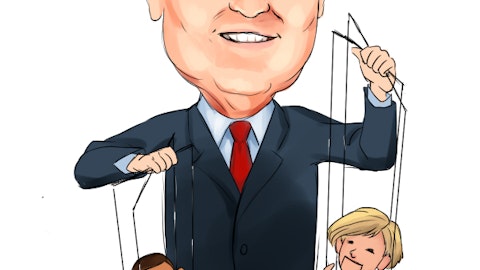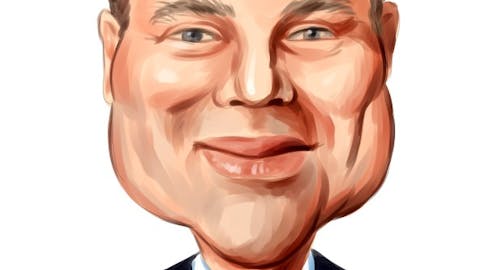Bronte Capital, an investment management firm, published its “Amalthea Fund” first quarter 2021 investor letter – a copy of which can be downloaded here. A return of 8.17% was delivered by the fund for the first quarter of 2021, outperforming the S&P 500 Index that delivered a +4.4% return for the same period. You can view the fund’s top 5 holdings to have a peek at their top bets for 2021.
Bronte Capital, in its Q1 2021 investor letter, mentioned ViacomCBS Inc. (NASDAQ: VIAC), and shared their insights on the company. ViacomCBS Inc. is a New York-based mass media company that currently has a $26 billion market capitalization. Since the beginning of the year, VIAC delivered a 7.43% return, extending its 12-month gains to 68.97%. As of June 18, 2021, the stock closed at $40.03 per share.
Here is what Bronte Capital has to say about ViacomCBS Inc. in its Q1 2021 investor letter:
“The debacle at Archegos Capital is extraordinary. Archegos is (or was) a family office of the former manager of Tiger Asia, a large hedge fund. Tiger Asia was progeny of the Tiger Fund complex, and the manager Bill Hwang was a protégé of Julian Robertson, one of the grandfathers of the hedge fund industry. This fund had pedigree. Yet it imploded, leaving multi-billion-dollar losses for certain counterparties, namely Nomura and Credit Suisse. The predecessor fund Tiger Asia closed after the firm (not the manager) pled guilty to criminal fraud. Bill Hwang (the manager) was rich, super rich. Press accounts have estimated his personal wealth to be in the range of US$8 billion. And yet somehow he felt it rational to lever that amount five to seven times, risking everything to buy more equities at ever-higher prices. And he did it in a lightly diversified portfolio, often in controversial names. The Wall Street Journal reports “[Hwang] liked to focus on stocks that were heavily ‘shorted,’ or had a high level of bearish positions, according to someone familiar with the trades…”.
A highly-levered, lightly-diversified portfolio of controversial names will kill you in the end. You are inevitably going to get one wrong one day—a position will fall 25 percent or more suddenly—and the leverage and margin calls will do the rest. It is simply extraordinary to us that someone with as much market experience would gamble in a fashion reminiscent of the hordes of retail investors buying garbage stocks on phone apps from Robinhood or other retail focused brokers.
But if the reports are to be believed, it wasn’t a garbage stock that triggered the rout. It was Viacom, a global media giant owning the American CBS Network, Paramount Pictures, MTV and many other media assets. Sure, Viacom is a controversial stock: old media is decaying and the young watch far less network TV. But it is a real business even though the price chart looks like that of a penny stock fraud.
The management of Viacom looked at the stock chart, did the math, and decided to issue shares. Viacom did a large and unexpected placement near the highs and the stock rapidly fell 25 percent. That was enough to trigger sequential margin calls over the whole Archegos portfolio.
The eagle-eyed will observe that Viacom is still trading above where it was at the end of 2020. You might ask how a stock falling back to levels last seen a few months ago can trigger a multibillion-dollar rout. The answer: degenerate gambling. The manager just levered up those profits and bought more shares in even more controversial stocks (some of which we were alas short and were squeezed on, though such positions were deliberately even tinier than usual).”

Our calculations show that ViacomCBS Inc. (NASDAQ: VIAC) does not belong in our list of the 30 Most Popular Stocks Among Hedge Funds. As of the end of the first quarter of 2021, ViacomCBS Inc. was in 89 hedge fund portfolios, compared to 44 funds in the fourth quarter of 2020. VIAC delivered a -58.88% return in the past 3 months.
Hedge funds’ reputation as shrewd investors has been tarnished in the last decade as their hedged returns couldn’t keep up with the unhedged returns of the market indices. Our research has shown that hedge funds’ small-cap stock picks managed to beat the market by double digits annually between 1999 and 2016, but the margin of outperformance has been declining in recent years. Nevertheless, we were still able to identify in advance a select group of hedge fund holdings that outperformed the S&P 500 ETFs by 115 percentage points since March 2017 (see the details here). We were also able to identify in advance a select group of hedge fund holdings that underperformed the market by 10 percentage points annually between 2006 and 2017. Interestingly the margin of underperformance of these stocks has been increasing in recent years. Investors who are long the market and short these stocks would have returned more than 27% annually between 2015 and 2017. We have been tracking and sharing the list of these stocks since February 2017 in our quarterly newsletter.
At Insider Monkey, we scour multiple sources to uncover the next great investment idea. For example, an activist hedge fund wants to buy this $26 biotech stock for $50. So, we recommended a long position to our monthly premium newsletter subscribers. We go through lists like the 10 best battery stocks to pick the next Tesla that will deliver a 10x return. Even though we recommend positions in only a tiny fraction of the companies we analyze, we check out as many stocks as we can. We read hedge fund investor letters and listen to stock pitches at hedge fund conferences. You can subscribe to our free daily newsletter on our homepage.
Disclosure: None. This article is originally published at Insider Monkey.




